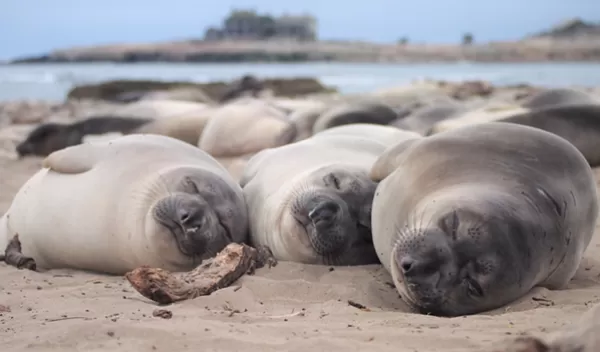
Elephant seals drift off to sleep while diving far below the ocean surface
For the first time, scientists have recorded brain activity in a free-ranging, wild marine mammal, revealing the sleep habits of elephant seals during the months they spend at sea.
The new findings, partially funded by the U.S. National Science Foundation and published in Science, show that while elephant seals may spend 10 hours a day sleeping on the beach during breeding season, they average just 2 hours of sleep per day when they are at sea on monthslong foraging trips. They sleep for about 10 minutes at a time during deep, 30-minute dives, often spiraling downward while fast asleep, and sometimes lying motionless on the seafloor.
"The ability to link physiology and behavior in free-ranging animals is important to understanding their adaptations to the environment," said Irwin Forseth, a program director in NSF's Division of Integrative Organismal Systems. "That will be increasingly valuable in determining how changes in marine ecosystems affect the future distribution, abundance and performance of these large mammals."
First author Jessica Kendall-Bar at UC San Diego's Scripps Institution of Oceanography led the study, working with Daniel Costa and Terrie Williams at UC Santa Cruz.
"For years, one of the central questions about elephant seals has been when do they sleep," said Costa. "The dive records show that they are constantly diving, so we thought they must be sleeping during what we call drift dives, when they stop swimming and slowly sink, but we really didn't know. Now we're finally able to say they're sleeping during those dives, and we also found that they're not sleeping very much overall compared to other mammals."
In fact, during their months at sea, elephant seals rival the record for the least sleep among all mammals, currently held by African elephants, which appear to sleep just 2 hours per day based on their movement patterns.
"Elephant seals are unusual in that they switch between getting a lot of sleep when they're on land, over 10 hours a day, and 2 hours or less when they're at sea," said Kendall-Bar.
Elephant seals are most vulnerable to predators such as sharks and killer whales when they are at the surface in the open ocean, so they only spend a minute or two breathing at the surface in between dives.
"They're able to hold their breath for a long time, so they can go into a deep slumber on these dives deep below the surface where it's safe," Kendall-Bar said.
Kendall-Bar developed a system that can reliably record brain activity (as an electroencephalogram or EEG) in wild elephant seals during their normal diving behavior at sea. With a neoprene headcap to secure the EEG sensors and a small data logger to record the signals, the system can be recovered when the animals return to the beach.
"We used the same sensors you'd use for a human sleep study at a sleep clinic and a removable, flexible adhesive to attach the headcap so that water couldn't get in and disrupt the signals," Kendall-Bar said.
In addition to the EEG system, the seals carried time-depth recorders, accelerometers and other instruments that allowed the researchers to track the seals' movements along with the corresponding brain activity. The recordings show diving seals going into the deep sleep stage known as slow-wave sleep while maintaining a controlled glide downward, then transitioning into REM (rapid eye movement) sleep, when sleep paralysis causes them to turn upside down and drift downward in a "sleep spiral."
